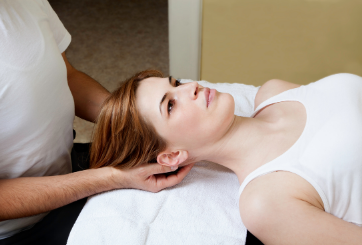Are you suffering from dizziness, motion sickness, anxiety, or unsteadiness? These may be symptoms that indicate you have BPPV (benign paroxysmal positional vertigo), or in some cases, it could even be vestibular neuritis. All these terms can sound confusing and even intimidating. But don’t worry! We at River Physio have got you covered. Our experts at River Physio have put together some essential information which will shed some light on BPPV, vestibular neuritis, and more!
What is BPPV?
BPPV is one of the most common causes of vertigo which is the sensation of spinning, even when you are not moving — it arises due to a disorder in the inner ear. If you have BPPV, being off-balance can be very distressing as it may lead to frequent falls and injuries. It causes brief episodes of varying intensities of dizziness and is usually accompanied by abnormal rhythmic eye movements (nystagmus). Dizziness that is brought upon by changes in head position is considered the hallmark of the condition. Although this condition can seem rather frightening, it is rarely serious.
Common symptoms and signs of BPPV include:
- Vertigo and dizziness
- Unsteadiness and loss of balance
- Nausea and vomiting
You should seek immediate medical attention if you encounter any sudden, severe, or recurrent unexplained dizziness or vertigo.
How can physiotherapy help with BPPV?
When you visit a Physiotherapy Clinic in Singapore, your physiotherapist will take a detailed medical history followed by some clinical tests. Your history and test results will provide essential clues to diagnose the condition. Once the diagnosis has been made, the specialist will employ integral repositioning techniques and manoeuvres to manage BPPV. But why is this needed? Displaced particles in the ear canal can cause acute vertigo. These physiotherapeutic repositioning techniques can effectively dislodge these particles with ease. In most patients, this treatment is adequate to resolve the issue. However, some may need further treatment – this is where vestibular rehabilitation therapy (VRT) in Singapore can step in and help you. Vestibular Rehabilitation Therapy employs specific exercises to retrain the brain to settle any following disequilibrium. This therapeutic intervention has been greatly successful in treating the symptoms of inner ear disorders.
VRT usually comprises:
- Gaze stabilisation exercises
- Habituation exercises
- Balance retraining exercises
The complexity of these exercises may vary depending on the patient, lifestyle, and the severity of the condition.
Vestibular neuritis
You might be familiar with this term if you are suffering from dizziness. But what is vestibular neuritis (also known as vestibular neuronitis), and how can it affect you? This condition occurs due to an inflammation of the cochlear nerve, which is responsible for directing messages from the inner ear to the brain. Inflammation may occur due to a bacterial or viral infection, affecting the inner ear or the cochlear nerve itself. Vestibular neuritis can also cause vertigo and dizziness, but it does not impair hearing; it usually affects only one ear. This condition usually lasts for a few weeks, but the disease may be chronic in some individuals.
Common symptoms and signs of vestibular neuritis include:
- Vertigo and dizziness
- Nausea and vomiting
- Unsteadiness and loss of balance
- Anxiety and poor concentration
- Fatigue
- Sensitivity to light and sound
The severity of these symptoms may vary depending on the causes of your condition.
What are the causes of vestibular neuritis?
Viral infections are the most common culprit responsible for causing vestibular neuritis. However, there are other causes for the condition:
- Bacterial infections
- Injury to the head and ear
- Benign tumours
- Allergies
- Side effects of certain medications
In most cases, vestibular neuritis may resolve on its own, but in patients where permanent damage has occurred — the symptoms may persist and require further investigation and treatment.
How is vestibular neuritis diagnosed?
While there is no specific investigation to diagnose the condition, at River Physio, our top Physiotherapists in Singapore make the proper diagnosis with the aid of a few tests such as:
- Balance tests
- Vision and hearing tests
- Blood investigations
- MRI or CT scans
Treating vestibular neuritis by physiotherapy
As with BPPV, Vestibular Rehabilitation Therapy in Singapore plays a significant role in managing vestibular neuritis. VRT can help enhance balance and walking ability and reduce pain, vertigo, dizziness, nausea, and vomiting. In addition to physical therapy and exercises, some patients may require medication to manage the symptoms.
The main goals of VRT are to improve the gaze and postural stability, relieve the symptoms of vertigo, and get patients back to their normal routines. The advantage of VRT is that it can be tailored for each patient individually — offering flexibility and freedom to do the exercises at your own pace. At our clinic, our therapists will guide you with the required advice and educate you on the condition so that you can be more aware and in control of your health and fitness. Despite this, some factors, such as a sedentary lifestyle, pain, certain medications, emotional concerns, and decompensation, can impact recovery. This must be tackled to achieve full recovery. You are not alone — our team at River Physio will be there every step of the way.
Vestibular neuritis treatment: Medical vs physical therapy
Physiotherapy aims to achieve a holistic strategy in any condition, but physical therapy alone may not be sufficient. In some instances, medication might be needed to manage the symptoms and delay the compensation of the central nervous system (CNS). Similarly, medication alone won’t help the cause; VRT is essential for the CNS to adapt to impaired function and improve the symptoms. Habituation, adaptation, and gait balance exercises are usually involved in treating vestibular neuritis.
At River Physio, you won’t have to worry about anything. Our team of committed and highly-qualified specialists will ensure that a proper diagnosis and treatment is provided to you. We have the best physiotherapists in Singapore who are specifically trained and certified in vestibular rehabilitation therapy. Contact us today!


